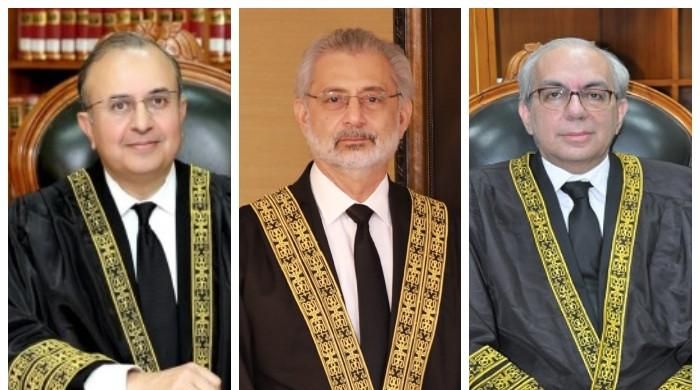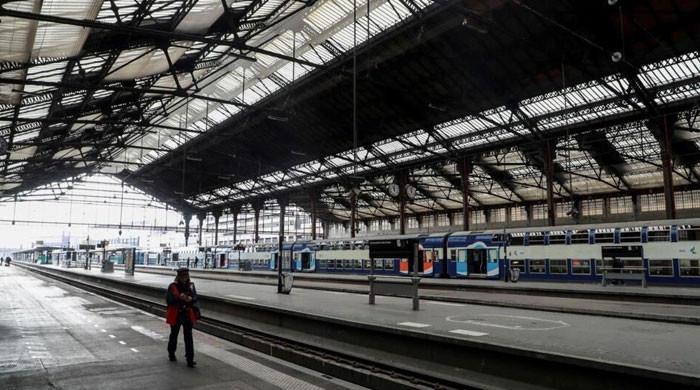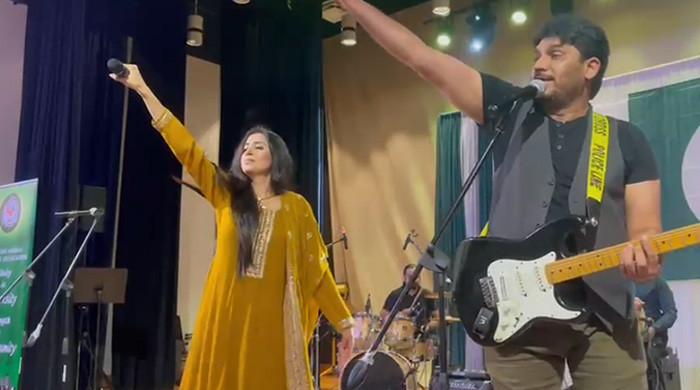- It would be an injustice if the petitions were not scheduled for hearing now: CJ Isa.
- The petitions will become “redundant” if the hearing is delayed, he said.
- The Chief Justice added that “constitutional law” should be preferred.
ISLAMABAD: The three senior judges of the Supreme Court are at loggerheads over fixing review petitions, against the apex court verdict on reserved seats in the national and provincial assemblies, for hearing.
News On Sunday, it was reported that Chief Justice of Pakistan (CJP) Qazi Faez Isa was at odds with Justice Syed Mansoor Ali Shah and Justice Munib Akhtar over fixing the review petitions for hearing as the former wants it disposed of immediately while the latter wants it to be heard after the summer vacation when the detailed judgment will be released.
Justice Isa said it would be an injustice if the date for hearing the arguments was not fixed, while Justice Mansoor and Justice Munib believed that a date could be fixed only after the 13-member bench published the detailed verdict on the July 12 sentencing.
During the 17th meeting of the committee constituted under Section 2 of the Supreme Court (Practice and Procedure) Act, 2023, held on July 18, both senior judges of the apex court opposed the idea.
Judge Munib participated in the meeting via video link as he is on vacation.
The majority of the committee members decided to set the date of the hearing after the summer break, when the entire court that announced the sentence would be available.
The committee secretary noted that in two urgent applications that were filed with the review petitions, the petitioners said that the order under review had fixed a time limit of 15 days and if that order was executed, the petitions would already be redundant.
Pursuant to Order XXVI, Rule 8 of the Supreme Court Rules, 1980, Justices Mansoor and Munib made the following observations that review petitions could be scheduled only before the bench which heard the case initially and since the bench is in the midst of its summer vacation and most of its judges are either abroad or on vacation, therefore, it would be appropriate for the matter to be disposed of after the vacation.
“It was also noted that petitions for review are not resolved until the court issues a detailed judgment and in this case the detailed judgment is still awaited,” the minutes of the meeting read.
Chief Justice Isa, however, insisted that the right of review was provided for in the Constitution and that such a right should take precedence over the convenience of the judges.
“Furthermore, since the judges had taken an oath to uphold the Constitution, it would be unjust and inequitable if the review petitions were not disposed of urgently,” the chief justice told the committee, stressing that the order under review required the reopening of the court even if it required the cancellation of the vacation.
In response, Justice Munib commented that the summer vacation was granted under Order II of the Rules. Rule 3 of that Order provides that the judicial year of the Court shall commence on the second Monday in September of each year and continue until the commencement of the vacation of the following year.
Justice Munib said Rule 4 provides that the summer vacation of the Court shall commence on June 15 or on such date as may be fixed every year by the Chief Justice and notified in the official gazette.
The judge noted that the Chief Justice by notification dated June 4, 2024, extended the date of commencement of summer vacation to July 15, 2024, however, there is no provision in the said order for cancellation of summer vacation once the same has been announced unless the matter is referred to the full bench and the rules are amended accordingly.
“Therefore, neither the committee nor the president of the Supreme Court can resort to the cancellation of the vacation,” the judge added.
Meanwhile, the committee considered and approved court shifts during the summer break from July 29 to September 6.
Meanwhile, CJP Isa said that the minutes of the meeting have been written by his colleagues with whom he cannot agree with regarding points 1 and 3 of the agenda and has written his own separate note.
PML-N files petition for review
On July 15, the Pakistan Muslim League-Nawaz (PML-N) filed a review petition in the Supreme Court against the reserved seats verdict that declared the Pakistan Tehreek-e-Insaf (PTI) eligible for the seats reserved for minorities and women.
The ruling party has named 11 respondents in the petition, including the Sunni Ittehad Council (SIC) and its president Hamid Raza, asking the court to stay its July 12, 2024 ruling on reserved seats.
The petitioner alleged that the Supreme Court's verdict did not address some points.
The petition for review raised a number of questions, including whether the SIC should be granted the reserved seats.
The question was raised whether reserved seats could be given to a political party which had not submitted a party list within the prescribed time, whether reserved seats could be given to a political party whose candidates had not even submitted their nomination papers within the time prescribed by the Election Commission of Pakistan and whether independents could even join a political party which had not won a single general seat in parliament.
The petition also raised the question of whether seats could be left vacant or would have to be distributed among the political parties competing for those seats.
The petition was filed in response to the Supreme Court's July 12 ruling, which declared the PTI eligible for allotment of reserved seats.
The decision not only paved the way for the return of the PTI to Parliament, which was ousted from the February 8 elections due to the ECP's December 2023 decision, but also increased pressure on the coalition alliance by changing the composition of the National Assembly.
The 8-5 majority verdict stated that the absence or denial of an electoral symbol does not in any way affect the constitutional or legal rights of a political party to participate in an election, whether general or by-election, and to field candidates and that the commission has a constitutional duty to apply all legal provisions accordingly.












